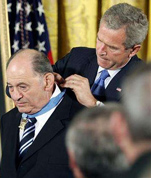- Home |
- About |
- Contact Us |
- RSS
Tibor Rubin - Medal of Honor Recipient
Concentration camp survivor who became a bonafide Korean War hero
Died: December 5, 2015 - Garden Grove, California

After being liberated from the camps by Allied forces, he immigrated to the United States in 1948, vowing that some day he was going to join the U.S. Army and fight alongside its soldiers to show his appreciation. Although he Initially failed the U.S. Army English entrance exam in 1949, Rubin passed in 1950 and was inducted into service.
After boot camp, Rubin was sent to the Korean frontlines where he very quickly established himself as a fearless soldier. In one such incident, while his company was retreating down a hill, Rubin defended the troops and single-handedly held of scores of Korean troops.
He inflicted a staggering number of casualties on the attacking force during his personal 24-hour battle, single-handedly slowing the enemy advance and allowing the 8th Cavalry Regiment to complete its withdrawal successfully.
--2005 Medal of Honor Citation
For this one act of bravery alone he was recommended four times for Medal of Honor citations, however, it is believed that the leader of Rubin's company was an ardent anti-semite and for this reason never put in the necessary paperwork for the citation.
When his regiment advanced into North Korea, Rubin helped to capture hundreds of Korean troops. On October 30, 1950, during a nighttime assault by Chinese forces, Rubin manned a machine gun after its previous gunners had become casualties and kept firing until it ran out of ammunition from that night thru to the next day. His actions helped slow the pace of the enemy and allowed the many men in his unit to retreat. As a result Rubin was severely wounded and he and the remains of his company were taken captive by the Chinese then placed in a POW camp.
While incarcerated Rubin snuck out nearly every night, despite the fact that getting caught meant most certain torture or execution, in order to steal food from enemy food storehouses and gardens for his comrades, keeping a reported 35-40 soldiers alive.
Rubin suffered greatly because he rejected the offers of the Chinese to deport him back to Hungary.
Corporal Rubin's gallant actions in close contact with the enemy and unyielding courage and bravery while a prisoner of war are in the highest traditions of military service and reflect great credit upon himself and the United States Army.
--2005 Medal of Honor Citation

In the 1980s, Rubin's friends began protesting the omission of never receiving the Medal of Honor, which soon caught the attention of politicians like Sen. John McCain, Rep. Robert Dornan, Rep. Robert Wexler and Rep. Benjamin Gilman, who began to campaign vigoursly on his behalf.
In 2001, the Jewish War Veterans Act was introduced into the U.S. House of Representatives, whose aim was "to direct the Secretaries of the military departments to conduct a review of military service records to determine whether certain Jewish American war veterans, including those previously awarded the Distinguished Service Cross, Navy Cross, or Air Force Cross, should be awarded the Medal of Honor."
On September 23, 2005, during a White House ceremony, 76 year old Tibor Rubin finally received his Medal of Honor. He died in December 2015.
- Since the Civil War, when the Medal of Honor was established by President Lincoln, there have been 18 Jewish recipients of the citation.
- During his career in the Army, Rubin received two Purple Heart awards.
- A very religious man, Rubin often told other soldiers that his good deeds were mitzvahs and that the most important thing for him was helping fellow men.
- As a young man Tibor Rubin competed as an amateur boxer in Germany.
- Rubin volunteered over 20,000 hours at the Long Beach Veteran's Hospital. After his death it was renamed the "Tibor Rubin VA Medical Center."
Some of these sites were used as source material for this entry and may be of interest to those looking to learn more about this person/topic.
SEE ALSO
 Copy the text below to cite your paper or article:
Copy the text below to cite your paper or article: 
